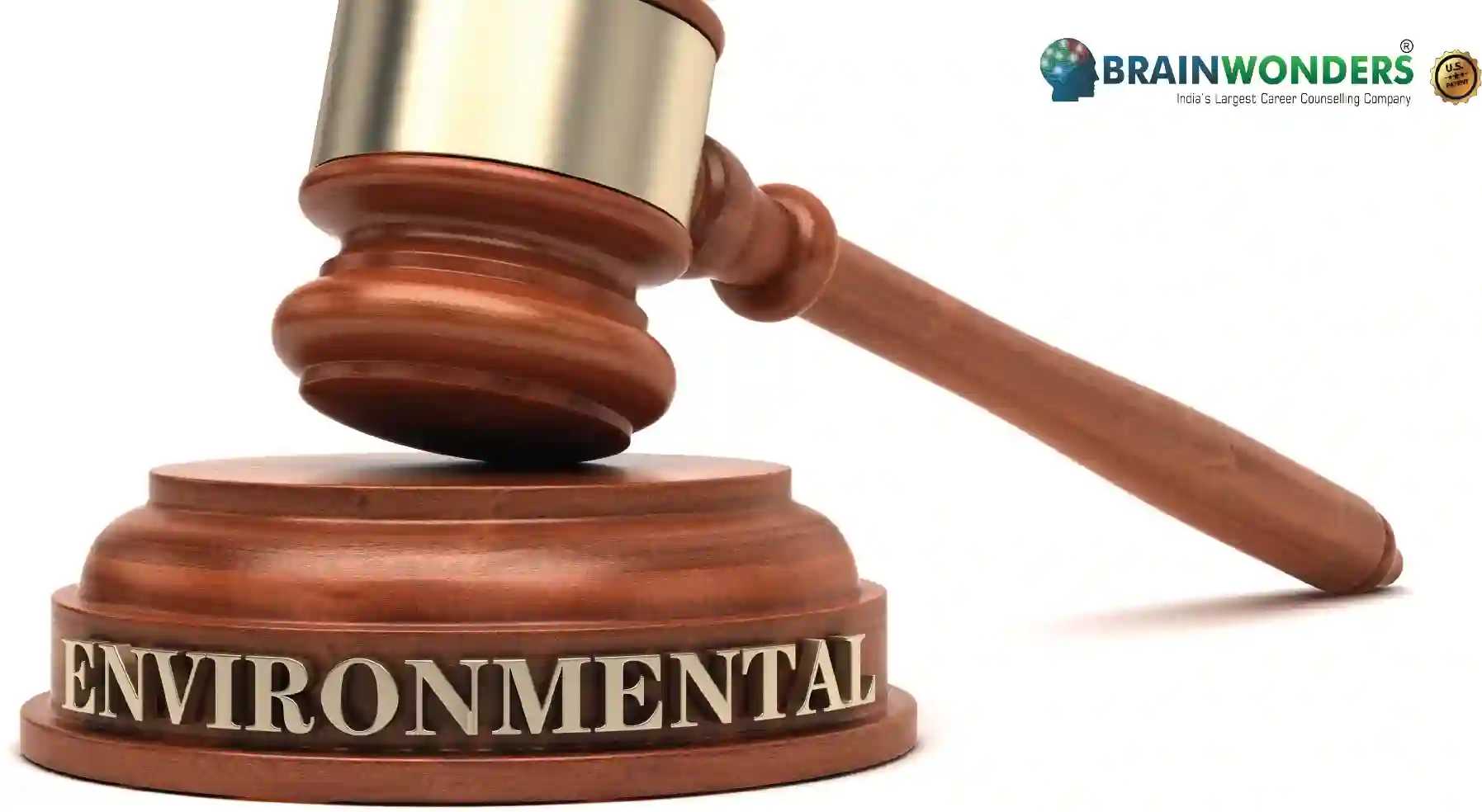How to become an Environmental Lawyer
Overview, Courses, Exam, Colleges, Pathways, Salary

Overview
Who is Environmental Lawyer ?
Environmental law is a broad area of law that governs how people interact with Earth's biological and geological systems. It covers a wide variety of environmental concerns, such as water and air quality, hazardous waste, species protection, agriculture, wetlands, biodiversity, waste management, green initiatives, sustainability plans, and alternative energy sources.
Environmental attorneys specialise in air, land, and water law. They guarantee that organisations and enterprises follow the government's laws and regulations on pollution and material management. They fight against behaviours that have a harmful influence on the environment, work to safeguard biodiversity, agriculture, and ecosystems, and address waste management challenges. Environmental lawyers also assist businesses in becoming more environmentally friendly and developing sustainable business practices.
Typical day at work
What does Environmental Lawyer do?
Environmental lawyers serve as consultants and legal counsel in the protection of the environment and natural resources. As consultants, they advise clients on their legal rights and responsibilities regarding the environment. In addition, environmental attorneys may operate as legal advocates for the prosecutor's office or in private practice, representing clients in criminal cases when charges have been made due to environmental infractions.
An environmental lawyer assists clients in legal fields such as environmental legislation in clean technology, water law, climate change law, and land management to inherent title and other public property. Environmental rights, international environmental law, the law of the sea, and international resource law are also being studied. Environmentalists also work on climate change, sustainability, and renewable energy.
- Analyze, interpret, infer data obtained from literature reviews, case law, precedents, criminal, civil and regulatory research, and sample findings
- Interview scientists to interpret data throughout the court process; to testify, inform, and give expert opinion
- Accumulate evidence and interview clients, witnesses, and people of interest
- Assess damages from a particular event; suggest or assign punitive monetary values or remediate actions to various internal and external stakeholders
- Use persuasion and carefully constructed logical arguments to convince jury and judge of legal culpability
- Determine if there is sufficient evidence contrary to the environmental regulations in question in order to proceed with prosecution
- Decide if prosecution of environmental offenders is in the public's best interest
- Participate in pre-trial negotiations and discovery sessions, often representing a corporation, government or other business entity
- Resolve upon both parties' rights, compulsions, and duties as they relate to environmental regulation
- Explain and illustrate how the environmental event or trend in question might impact the earth or a specific region of earth, as well as human or animal populations
- Counsel clients their organizations about their rights under current regulation as well as their obligations
- Act as both advisors and legal lawyers in the safeguard of the environment and natural resources
- Use model data to interpret information about current situations and potential resolutions
- Converse during court proceedings with shareholders on firmly focused environmental instances or wide environmental trends
Review files to determine if there is sufficient evidence to proceed with prosecution and if the proposed prosecution is in public interest.
- Review operative and applicable legislation to determine the client’s/defendant’s rights, obligations, and duties
- Draft pleadings and correspondence
- Research legislation and court decisions
- Deliver legal and policy advice to regulatory and investigating organizations
- Negotiate agreements with landowners and governments and between industry participants.
- Participate in public-interest lobbying and education campaigns.
- Endorse positive effort group systems for a perplexing work setting
- Provide mentorship opportunities to junior team members
- Assist criminal, civil and environmental investigators where infractions are suspected
- Advocate for the public interest via lobbying and education campaigns
- Provide consultation and legal advice to external agencies, professionals, individuals or researchers
- Ensure that written affidavits, testimonies, and summative reports are accurate
- Plan, organize and participate in advocacy programs to engage the public.
Abilities and Aptitude needed
What are the skills, abilities & aptitude needed to become Environmental Lawyer?
Environmental law is a vast and complicated area of legal practice. As a result, one must be capable of comprehending highly technical information such as raw data, scientific literature, and precedent cases, which may be utilised to evaluate contemporary legal issues that impact the environment in some way.
Environmental attorneys are often responsible for sifting through written rules and other documents to develop client recommendations, legal defences, and legal advice; therefore, research skills are very crucial.
An excellent environmental lawyer should communicate effectively both vocally and in writing. Analytical and critical thinking, problem-solving, social sensitivity, interpersonal skills, time management, and negotiating are all required.
The capacity to convince others to agree with one's point of view may assist one win a court case. However, the attorney must also be able to prepare and combine a plethora of information into a successful case.
Pathways
How to become an Environmental Lawyer?
Entrance Exam
Entrance Exam for Environmental Lawyer ?
Courses
Which course I can pursue?
Best Colleges
Which are the best colleges to attend to become an Environmental Lawyer?
Industries
Which Industries are open for Environmental Lawyer?
internship
Are there internships available for Environmental Lawyer?
Career outlook
What does the future look like for Environmental Lawyer?
- There are a number of places environmental lawyer’s jobs include:
- Federal, provincial/territorial, and municipal governments to assess risks, serve as advisors on environmental issues, or help create policies
- Private law firms
- Environmental consulting firms
- Colleges, universities, and research institutes
- Large firms in other industries of oil and gas, mining, telecommunications, and manufacturing to guide them through legal issues involving regulatory compliance and litigation challenges
- Agricultural and Fishing Industries for regulations on soil quality, crop yields and livestock issues
- Automobile Companies for understanding of the legal issues with regard to emissions and other environmental factors
- Insurance companies
- Not-for-profit, non-governmental, and international organizations to provide legal assistance to different cases
- Public-Interest Organizations





.webp)

